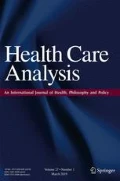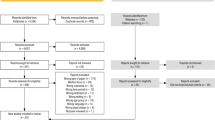Abstract
The aim of this study was to explore the relational aspects of the consent process for HPV vaccination as experienced by school nurses, based on the assumption that individuals have interests related to persons close to them, which is not necessarily to be apprehended as a restriction of autonomy; rather as a voluntary and emotionally preferred involvement of their close ones. Thirty Swedish school nurses were interviewed in five focus groups, before the school based vaccination program had started in Sweden. The empirical results were discussed in light of theories on relational autonomy. The school nurses were convinced that parental consent was needed for HPV vaccination of 11-year-old girls, but problems identified were the difficulty to judge when a young person is to be regarded as autonomous and what to do when children and parents do not agree on the decision. A solution suggested was that obtaining informed consent in school nursing is to be seen as a deliberative process, including the child, the parents and the nurse. The nurses described how they were willing strive for a dialogue with the parents and negotiate with them in the consent process. Seeing autonomy as relational might allow for a more dialogical approach towards how consent is obtained in school based vaccination programs. Through such an approach, conflicts of interests can be made visible and become possible to deal with in a negotiating dialogue. If the school nurses do not focus exclusively on accepting the individual parent’s choice, but strive to engage in a process of communication and deliberation, the autonomy of the child might increase and power inequalities might be reduced.
Similar content being viewed by others
References
Beauchamp, T. L., & Childress, J. F. (2001). Principles of biomedical ethics. Oxford: Oxford University Press.
Benhabib, S. (1992). Situating the self, gender, community and postmodernism in contemporary ethics. New York: Routledge.
Bird, S. (2007). Children and adolescents—who can give consent? Australian Family Physician, 36(3), 165–166.
Bosch, F. X., Burchell, A. N., Schiffman, M., Giuliano, A. R., de Sanjose, S., Bruni, L., et al. (2008). Epidemiology and natural history of human papillomavirus infections and type-specific implications in cervical neoplasia. Vaccine, 26(Suppl 10), K1–K16.
Corley, M. C., Elswick, R. K., Gorman, M., & Clor, T. (2001). Development and evaluation of a moral distress scale. Journal of Advanced Nursing, 33(2), 250–256.
Donchin, A. (2001). Understanding autonomy relationally: Toward a reconfiguration of bioethical principles. Journal of Medicine and Philosophy, 26(4), 365–386.
Dworkin, G. (1988). The theory and practice of autonomy. Cambridge: Cambridge Studies in Philosophy.
English, A., Shaw, F. E., McCauley, M. M., & Fishbein, D. B. (2008). Legal basis of consent for health care and vaccination for adolescents. Pediatrics, 121(Suppl 1), S85–S87.
Farrell, R. M., & Rome, E. S. (2007). Adolescents’ access and consent to the human papillomavirus vaccine: A critical aspect for immunization success. Pediatrics, 120(2), 434–437.
Gottvall, M., Tyden, T., Larsson, M., Stenhammar, C., & Hoglund, A. T. (2011). Challenges and opportunities of a new HPV immunization program perceptions among Swedish school nurses. Vaccine, 29(28), 4576–4583.
Graneheim, U. H., & Lundman, B. (2004). Qualitative content analysis in nursing research: Concepts, procedures and measures to achieve trustworthiness. Nurse Education Today, 24(2), 105–112.
Hardwig, J. (1990). What about the family? Hastings Center Report.
Hilton, S., Hunt, K., Bedford, H., & Petticrew, M. (2011). School nurses’ experiences of delivering the UK HPV vaccination programme in its first year. BMC Infectious Diseases, 11, 226.
Ho, A. (2008). Relational autonomy or undue pressure? Family’s role in medical decision-making. Scandinavian Journal of Caring Sciences, 22(1), 128–135.
Hunt, M. R., & Ells, C. (2011). Partners towards autonomy: Risky choices and relational autonomy in rehabilitation care. Disability and Rehabilitation, 33(11), 961–967.
Jameton, A. (1984). Nursing practice: The ethical issues. Englewood Cliffs, NJ: Prentice-Hall.
Kitzinger, J. (1995). Qualitative research. Introducing focus groups. BMJ, 311(7000), 299–302.
Limia, A., & Pachon, I. (2011). Coverage of human papillomavirus vaccination during the first year of its introduction in Spain. Eurosurveillance Weekly, 16(21), 12–15.
Mackenzie, Catriona., & Stoljar, Natalie. (2000). Relational autonomy: Feminist perspectives on autonomy, agency, and the social self. New York: Oxford University Press.
Mikkelsen, G., & Frederiksen, K. (2011). Family-centred care of children in hospital—a concept analysis. Journal of Advanced Nursing, 67(5), 1152–1162.
Mosina, L., Martin, R., Eckert, L. (2010). HPV vaccination in Europe: Experience from national immunization programmes WHO: 5th annual global immunization meeting Retrieved January 9, 2012, from http://www.who.int/immunization_delivery/systems_policy/HPV_vaccination_in_Europe.pdf.
Musschenga, A. W. (2005). Empirical ethics, context-sensitivity, and contextualism. Journal of Medicine and Philosophy, 30(5), 467–490.
Ogilvie, G., Anderson, M., Marra, F., McNeil, S., Pielak, K., Dawar, M., et al. (2010). A population-based evaluation of a publicly funded, school-based HPV vaccine program in British Columbia, Canada: Parental factors associated with HPV vaccine receipt. PLoS Med, 7(5), e1000270.
Shields, L. (2010). Questioning family-centred care. Journal of Clinical Nursing, 19(17–18), 2629–2638.
Socialstyrelsen. (2008). Background to a vaccination programme for the human papilloma virus in Sweden 2007 Retrieved Aug 14, 2012, from http://www.socialstyrelsen.se/Lists/Artikelkatalog/Attachments/8868/2008-132-2_20081322.pdf.
Stretch, R., McCann, R., Roberts, S. A., Elton, P., Baxter, D., & Brabin, L. (2009). A qualitative study to assess school nurses’ views on vaccinating 12–13 year old school girls against human papillomavirus without parental consent. BMC Public Health, 9, 254.
UN. Office of the United Nations High Commissioner for Human rights: Convention on the rights of the child Retrieved Jan 23, 2011, from http://www2.ohchr.org/english/law/crc.htm.
Widgren, K., Simonsen, J., Valentiner-Branth, P., & Molbak, K. (2011). Uptake of the human papillomavirus-vaccination within the free-of-charge childhood vaccination programme in Denmark. Vaccine, 29(52), 9663–9667.
WMA. (2008). WMA declaration of Helsinki—ethical principles for research involving human subjects. Retrieved April 10, 2012, from http://www.wma.net/en/30publications/10policies/b3/index.html.
Wood, F., Morris, L., Davies, M., & Elwyn, G. (2011). What constitutes consent when parents and daughters have different views about having the HPV vaccine: Qualitative interviews with stakeholders. Journal of Medical Ethics, 37(8), 466–471.
Acknowledgments
This study was funded by the Swedish Cancer Society and the Solsticke Foundation. We are most grateful to the school nurses who participated in the investigation. Thanks also to the Ethics of Family in Health and Social Care Research Consortium as well as to the anonymous reviewers of HCAN for helpful comments on earlier versions of the manuscript.
Author information
Authors and Affiliations
Corresponding author
Rights and permissions
About this article
Cite this article
Gottvall, M., Tydén, T., Larsson, M. et al. Informed Consent for HPV Vaccination: A Relational Approach. Health Care Anal 23, 50–62 (2015). https://doi.org/10.1007/s10728-012-0237-9
Published:
Issue Date:
DOI: https://doi.org/10.1007/s10728-012-0237-9



